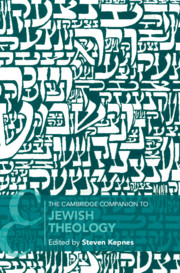Book contents
- The Cambridge Companion to JEWISH THEOLOGY
- cambridge companions to religion
- the cambridge companion to JEWISH THEOLOGY
- Copyright page
- Contents
- Notes on Contributors
- Acknowledgements
- 1 Introduction
- 2 What is Jewish Theology?
- Part I Biblical-Rabbinic
- Part II Medieval
- Part III Modern
- Part IV Contemporary Issues
- 12 The Holocaust and Jewish Theology
- 13 Theology and Halakhah in Jewish Feminisms
- 14 Jewish Models of Revelation
- 15 Jewish Theology of Religions
- Part V Analytic Philosophy and Theology
- Index
- Other Titles in the Series (continued from page ii)
- References
14 - Jewish Models of Revelation
from Part IV - Contemporary Issues
Published online by Cambridge University Press: 03 December 2020
- The Cambridge Companion to JEWISH THEOLOGY
- cambridge companions to religion
- the cambridge companion to JEWISH THEOLOGY
- Copyright page
- Contents
- Notes on Contributors
- Acknowledgements
- 1 Introduction
- 2 What is Jewish Theology?
- Part I Biblical-Rabbinic
- Part II Medieval
- Part III Modern
- Part IV Contemporary Issues
- 12 The Holocaust and Jewish Theology
- 13 Theology and Halakhah in Jewish Feminisms
- 14 Jewish Models of Revelation
- 15 Jewish Theology of Religions
- Part V Analytic Philosophy and Theology
- Index
- Other Titles in the Series (continued from page ii)
- References
Summary
In this paper, I present a range of contemporary Jewish theological approaches to revelation with the aim of highlighting an array of opinions for beginning a discussion of a Jewish theology of revelation. I use models in theology because a “models approach” helps one place the thinkers into conceptual rubrics loosely based on the models of the Catholic theologian Avery Dulles. We discuss seven different models of Jewish Revelation. (1) the historic event model (2) the dialectic model (3) the mystical model (4) the Verbal model (5) the human potential model (6) the negative theology model and the (7) Hermenutical model
- Type
- Chapter
- Information
- The Cambridge Companion to Jewish Theology , pp. 316 - 343Publisher: Cambridge University PressPrint publication year: 2020



